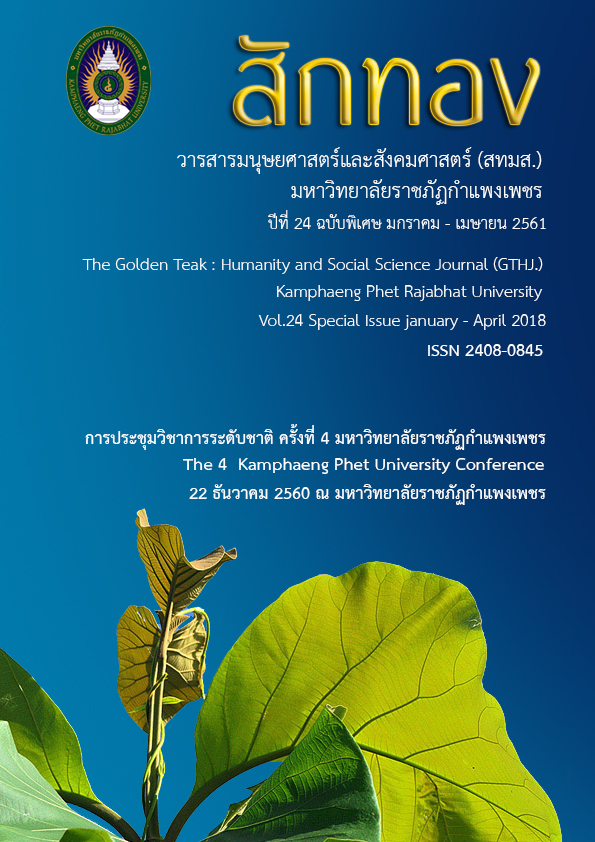Factors Affecting Risk Behaviors of Higher Education Students in the Lower Northeastern Region
Main Article Content
Abstract
The objectives of this research were to study the risk behaviors of higher education students studying in the Lower Northeastern region. In addition, factors related to risk behaviors and factors affecting risk behaviors of higher education students in the Lower Northeastern region were examined. The research samples used in this study were 877 undergraduate students studying in the academic year 2016 in the Lower Northeastern region. Multi-stage sampling method was employed. The research instrument used to collect the data was a five-point rating scale questionnaire which assessed risk behavior in 6 aspects namely; ‘safety’, ‘addictive substance’, ‘sex’, ‘gambling’, ‘health care’, and ‘studying’ as well as assessed factors related to students’ risk behaviors in 7 aspects namely; ‘self-worth’, ‘achievement motivation’, ‘family relationship’, ‘parenting abandonment’, ‘excessively careful parenting’, ‘school atmosphere’, and ‘school environment’. The reliability of the whole questionnaire was within the rage of 0.80-1.00. The reliability by aspects was within the range of 0.642-0.911. The statistical methods used to analyze the data were standard deviation and Multiple Regression Analysis. The results were as follows. 1) The students’ risk behavior in overall was in a low level. When considering by aspect, the results revealed that 1 aspect was in a moderate level and 5 aspects were a low level. The aspect with highest mean score was ‘health care’, followed by ‘studying’, ‘safety’ and ‘sex’ respectively. 2) Factors related to risk behaviors of students were in a high level in 5 aspects, moderate level in 2 aspects. The aspect with the highest mean score was ‘family relationship’, followed by ‘achievement motivation’. The aspect with lowest mean score was‘parenting abandonment’. 3) All 7 predictive variables can be predicted together. The variance of overall risk behaviors was 16.9%. The predictive variables with the highest predictive power at the significant level of 0.01 were ‘parental abandonment’, and ‘excessively careful parenting’. Other predictive variables had low predictive power. The predictive equation was in the form of standard score as follows.
Zrisk' = 0.360**(sup)+0.109**(care)-0.045(moti)+0.035(envi)-0.028(study)-0.017(value)-0.006(rela)
Article Details
บทความที่ได้รับการตีพิมพ์เป็นลิขสิทธิ์ของวารสาร สักทอง : วารสารมนุษยศาสตร์และสังคมศาสตร์ สถาบันวิจัยและพัฒนา มหาวิทยาลับราชภัฏกำแพงเพชร
ข้อคิดเห็นใดๆ ที่ปรากฎในวารสารเป็นวรรณกรรมของผู้เขียนโดยเฉพาะ ซึ่งมหาวิทยาลัยราชภัฏกำแพงเพชรและบรรณาธิการไม่จำเป็นต้องเห็นด้วย
References
Ecology (special edition), 65-70.
Boonrod, L. (2000). The Study of Health Behaviors of Lower High School Students in Schools under the Department of General Education. Master of Education’s
Thesis Chulalongkorn University.
Chidmongkhol, R. & Bariban, B. (2012, January-April). Factors Affecting Achievement
Motivation of Students at Boromarajonani College of Nursing. Journal of Nursing,
Ministry of Public Health, 22(1), 98-100.
Euaphantaseth, R. & Tanwattanakul, W. (2004, April-June). Attitudes and Health Behaviors of
Students in the Field of Humanities and Social Sciences, Chiang Mai University. Journal of Health Promotion and Environmental Health, 27(2),42-54.
Horadal, A. & Jitisathain, C. (2015). Factors Affecting the Development and Learning of
Pre-school Students. In the instructional materials, Development and Learning of
Pre-school Students. Nonthaburi : Sukhothai Thammathirat Open University.
Ketman, P. (2012). Risk Behaviors in Adolescents. [Online]. Available : www.psyclin.co.th.
[2017, May 11].
Khiaoyoo, T. (2003). Risk Behavior of Upper High School Students. Public Health Master’s Thesis, Khon Kaen University.
Phoonkham, Y., et al. (2010). Health Promotion, Risk Behaviors and Youth Health Problems. Bangkok : Department of Health, Ministry of Public Health.
Smoraphum, C. (2011). Causal Factors and the Prevention of Drinking Behaviors of Adolescent Students in Northeast of Thailand. Doctoral Dissertation, Burapha University.
Sombat, L. (2006). Elderly Care in the Current Family Project. Bangkok : Mister Copy.
Sornsri, C. (1998). The Study of Risk Behaviors among Adolescents in Secondary Schools.
Nursing Science Master’s Thesis. Mahidol University.
Sukseang, S, ThammaCharoen, R. & Sangkhaphan, J. (2015). Factors Influencing Risk
Behaviors of Using Substance Abuse. Lower Secondary School Students in Songkhla Province. Songkhla : Faculty of Education and Liberal Arts, Hatyai University.
Tanya, S., et al. (2008). Emotional Intelligence and Risk Behavior of Students.
Nakhon Ratchasima : Nakhon Ratchasima Rajabhat University.


